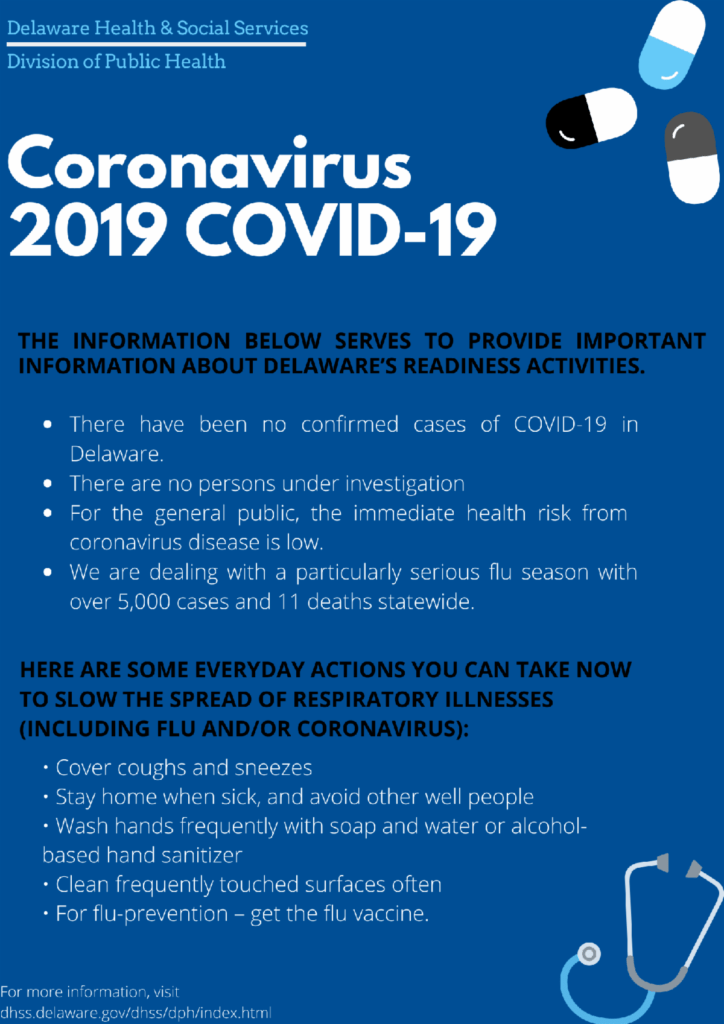Delaware,
As I’m sure you are aware, there is a lot of information going around about COVID-19, also called the Novel Coronavirus.
The public health professionals at the Delaware Department of Health and Social Services are carefully monitoring the situation and prepared to respond.
Below you will find some useful information about their work and everyday measures you can take to prevent the spread of this and other infectious diseases in our area.
Visit de.gov/coronavirus for the most accurate and up-to-date information and
feel free to reach out to my office at nicole.poore@delaware.gov if you have any questions.
I will be working with DHSS to keep everyone updated on COVID-19 in the coming weeks and months.
Thank you,
Nicole Poore
Senator, District 12

What is Coronavirus Disease?
- The respiratory virus, first identified in Wuhan, China, has been named SARS-CoV-2 and the disease it causes is known as coronavirus disease 2019 (COVID-19).
- It has the potential to cause severe illness and pneumonia in some people.
- No cases have been confirmed in Delaware at this time.
- The risk to the general public still remains low at this time.
What Delawareans Can Do
- Take steps to avoid spreading germs from any respiratory diseases by:
- Get your flu vaccine if you have not already done so.
- Covering your cough.
- Staying home if you are sick.
- Washing your hands.
- It is currently flu and respiratory disease season, and flu activity is still high and expected to continue for a number of weeks.
- Anyone who recently traveled to China, Italy, South Korea or Iran in the past 14 days is asked to contact the Division of Public Health at 1-888-295-5156 to advise so we can provide recommendations for self-monitoring at home.
- Anyone returning from those countries in the past 14 days who experiences fever, cough, or other acute illness should contact DPH at 1-888-295-5156 to discuss your symptoms and potential next steps which may include transport to a health care facility, and testing. If your symptoms are severe enough to require calling 9-1-1, inform the 9-1-1 operator of your recent travel and symptoms.
- The U.S. Department of State issued a travel advisory on January 31, 2020 advising U.S. citizens not to travel to China due to the ongoing situation involving the 2019 novel coronavirus. On Feb. 26, 2020, the State Department issued a travel advisory not to travel to Iran. On Feb. 29, 2020, the State Department issued travel advisories to reconsider travel to South Korea and Italy, and not to travel to Daegu, South Korea, or the Lombardy and Veneto regions of Italy. Travelers should be prepared for travel restrictions to be put into effect with little or no advance notice, and commercial carriers have reduced or suspended routes to and from China, Italy and South Korea. Keep updated on the most recent travel advisories on the CDC website at: https://www.cdc.gov/coronavirus/2019-ncov/travelers/index.html.
What DPH is Doing
- We are in contact with the Centers for Disease Control and Prevention (CDC), as well as other local and national partners to share information.
- We have sent information to health care providers around the state with current recommendations for screening and testing for COVID-19, as well as to EMS providers regarding proper protection procedures.
- We are holding frequent calls with staff and our state and health care provider partners to remain apprised of the latest updates.
- Sharing messaging with partners and the public as it becomes available.
- This is a rapidly evolving situation, so information and recommendations are likely to change quickly as well. We will continue to learn more in the coming days and share new information as it is available.
How Does It Spread?
- Through the air by coughing and sneezing
- Close personal contact, such as touching or shaking hands
- Touching an object or surface with the virus on it, then touching your mouth, nose, or eyes
Who Is at Risk?
- Travelers to and from certain areas of China, Italy, South Korea and Iran are at increased risk as are their close contacts
- Current risk to the general public is low
- See travel guidance from the Centers for Disease Control and Prevention at wwwnc.cdc.gov/travel.
Symptoms
For confirmed COVID–19 infections, reported illnesses have ranged from infected people with little to no symptoms (similar to the common cold) to people being severely ill and dying. Symptoms can include:
- Fever
- Cough
- Shortness of breath